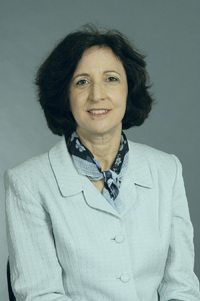The virtues of teaching, and the teaching of virtue
Bernice Lerner talks about character, education, and bringing the two together

Bernice Lerner, director of the Center for the Advancement of Ethics and Character at the School of Education, helped coordinate this week’s conference for teachers at SED, “Educating Heart and Mind: The Theory and Practice of Character Education.” Nearly 40 teachers and school administrators are attending. BU Today spoke with Lerner about character, education, and the struggle to wed the two concepts in a lasting marriage.
BU Today: What is character education?
Lerner: As we mean it today, any intentional effort on the part of a school community and its leaders to educate for character. Character education is about helping students to develop virtues, good habits and dispositions that will help them make responsible and mature choices in their lives. Virtue, this old-fashioned Victorian term, is really the foremost concern. It doesn’t have anything to do with having the right political views or espousing currently accepted views about prayer in school or gays in the military. It’s about universal human and moral values that all people would agree to be good. And it’s about helping teachers embrace their moral mandate and authority. They know what right and wrong is and they have to be clear about it and take a stance.
To what extent do schools educate character today?
I think it varies greatly. There is a private school in an affluent Boston suburb. They really want to believe they are doing character education, ethics education. They send home magnets for every family’s refrigerator with the 10 rules of civility. They speak the language. But there is a kid in that school who was teased so mercilessly by his classmates and he was in so much pain that he can’t face the day, and he quit in the middle of seventh grade. The school is saying all the right things but not following through by saying “We really mean it. Were going to enforce it, and crack down and never let anyone get away with this.”
What needs to be done differently?
It’s very powerful when an entire faculty and staff are on board. We do a lot of training with public school teachers, but it’s very lonely for a public school teacher to be trained in the academy and go back on their own. They need a core group of their colleagues to make it systemic, and you have to have a principal who really cares. It has to come from the top, but you also have to have buy-in at every level; students, parents and community leaders. The tragedy is most schools don’t have that.
What undermines teachers’ efforts in character education?
They burnout and forget. Most teachers go into teaching because they care so much about kids and then forget why they went into it in the first place.
Who exemplifies examples of good character?
Martin Luther King, Abraham Lincoln. I teach writing course called resistance during the Holocaust. I don’t walk in and say today we are going to do character education, but I put before them a lot of case studies of people, and I’m hoping that there is something soul-turning in them. One example is Sophie Scholl (a student who was beheaded for her involvement in a non-violent Nazi resistance). It can also be taught through literature. Students can ask how did Daisy Buchanan act in The Great Gatsby? What were the choices that the protagonist made? It’s the search for the right course of action. They have to weigh it. There is a right answer.
Aristotle’s nicomachean ethics are our bible here. He outlines in pretty great detail how a wise, just and noble person goes about making choices in his or her life. It doesn’t have to be an extreme situation, it can be in every day life.
What is the role of religion in character education? Is it necessary?
It is hard to ignore the vast corpus of wisdom we have in our civilization. It’s so rich. There are huge samplings from various faiths and traditions that in the aggregate illustrate universal human values. It’s not just one group of people who invented ethics, it’s from East and West, and everywhere, and it’s very worth exploring.
Is character education more important now than it has been?
No it’s the oldest mission of schools.
Have you seen progress? Do people have more character today than they had years ago?
No, there has been no progress. The 20th century was supposed to be so enlightened. But look at genocide and horrors that have happened since the Age of Enlightenment.